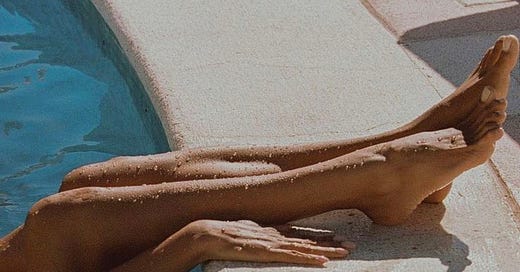At the start of the year, I spent hours tweaking my Notion board. Not to optimize my workflow, streamline my business, or unlock my next big idea—just to make my content ideas look beautiful. I added Pinterest-sourced photo cards—each one carefully paired with an image of moody flowers, activating quotes, or perfectly curated art. It serves no purpose other than that it’s pretty and makes me happy.
In the past, I would’ve claimed that time spent was ‘avoidance’ or ‘over-tinkering’ or somehow a waste of my precious energy and time (and that can still be true sometimes).
But the truth is… in this instance, I just wanted to do it, liked doing it, and now—post-doing-it—it brings me joy.
Last week, my husband stayed home because of a snow-day and I decided to make us a bit of a lunch-production. Now, I’m not typically the cook in this household, so something as simple as tacos did take some time and energy and, yes, created quite a mess. But I enjoyed it.
None of that made it to social media, became part of my brand, or anything with any kind of “ROI”—I just enjoyed the process.
And that’s exactly why they mattered.
Why Does Everything Have to Mean Something?
It might sound counterintuitive coming from someone who constantly asks, What’s the intention? But hear me out: I have the 37-40 channel as my conscious sun and earth—I really like to know if “the juice is worth the squeeze.” Some could say that discernment—and ability to decide, no, it’s not, is one of my gifts.
But even in the near constant ask of that question, what I’ve realized is, sometimes the answer is as simple as to have fun or because I want to. To explore my creativity. To make space for the parts of me that don’t have to work so damn hard all the time.
But somewhere along the way, we were taught that everything needs a reason—a "GOOD" reason. Capitalism has twisted our understanding of value, assigning a moral weight to things that don’t have any real moral bearing. It didn’t just teach us that work is important—it convinced us that work is morally superior to fun or pleasure. That rest is laziness. That play is childish. That ‘wasting time’ is a sin.
Who benefits from that belief? Who decided that making money is virtuous but lying on the couch all afternoon is indulgent? Who benefits when we internalize guilt for resting, but not for overworking? Who gains from our inability to enjoy something without making it productive? (Spoiler: It’s not us.)
When we start asking these questions, we realize that this isn’t just the way things are. This is a system we’ve been trained into—one that unconsciously dictates our every move. We weren’t born believing our time had to be profitable. We were taught. And the beautiful thing about that? We can unlearn it.
This isn’t just a system we participate in—it’s one we enforce on ourselves and each other. We’ve become our own prison guards, so scared of being seen "wasting time" that we create invisible rules around what is acceptable and what isn’t. There’s this deep-seated fear of being caught doing dumb shit, as though someone—our boss, a partner, or even just an invisible jury of society—is watching and waiting to call us out.
And even when no one is watching, we do it to ourselves. We catch ourselves mid-lazy afternoon and feel the creeping guilt. We justify our joy like we’re giving a PowerPoint presentation to an invisible panel of investors, as if we need a solid business case for why we spent an hour playing The Sims.
I see it with my clients all the time—this worry that their spouse will come home to see them mid Horizontal Reset and be annoyed that they aren’t working, or that there are still dishes in the sink. This fear that if they don’t stay busy, their parents or family may judge them for ‘not being successful enough, yet’. This jump to defense anytime small talk leans in the ‘staying busy?’ direction.
(My secret favorite flex? Answering that last question with, no, not really and watching the confusion stream across the asker’s face.)
But, I digress. In those dynamics, if we got really honest with ourselves, I’m sure none of us want to be that judge and jury towards the people we love. I want my partner to have joy, to spend time doing things just because, to explore curiosities and passions. I want my friends to do things that make them happy for no other reason than they get to be happy.
So why don’t we extend the same grace to ourselves?
Resisting Boredom and ADHD
Maybe part of this is about our resistance to being bored. Because joy isn’t always loud or exciting—it’s not always fireworks or Instagrammable moments. Sometimes it’s quieter. Sometimes it’s in the slow, unremarkable spaces of life.
But we’ve been trained to avoid boredom at all costs. To scroll, to fill, to distract ourselves from the quiet moments that feel too still, too empty. We’ve forgotten how to sit with ourselves, to allow our minds to wander, to play without needing a plan.
And yet, boredom isn’t the enemy we’ve made it out to be. We think of it as something to fix, something to escape, something unproductive. But boredom, in its rawest form, is just a signal—an invitation. It’s the in-between space where our minds stretch, our creativity sparks, our nervous systems settle. It’s where some of our best ideas come from.
But stillness—that blank space where boredom lives—can feel impossible to access. Because before we can settle into it, we first have to move through the discomfort of not filling it.
And as someone with ADHD, this can feel especially challenging. It can be a fine line between the inability to stay still in the hunt for dopamine and doing the random thing that truly sparks joy.
Often, the moment stillness enters the room, my brain immediately starts looking for something to latch onto, to entertain itself with. The urge to refresh, check, tinker, do is constant. Boredom isn’t just uncomfortable—it feels like an itch I can’t scratch, like my brain is physically rejecting the idea of doing nothing.
And here’s the tricky part: not everything that feels like relief in the moment is actually joy. ADHD loves a dopamine hit, but not all dopamine is created equal. Mindless doom-scrolling? Checking and rechecking the same three apps? That’s not actually joy—that’s my brain frantically trying to self-soothe. That’s grasping for stimulation, not delight.
But when I let myself really choose, when I give myself permission to follow my curiosity rather than just reach for whatever’s easiest, something shifts. Instead of scrolling, I might go reorganize my bookshelves for no reason. Instead of refreshing my inbox, I might go stand outside and just be for a second. Instead of fidgeting with something out of restlessness, I might open my Notes app and write nonsense just to see where my mind takes me.
Joy—real joy—isn’t just about chasing dopamine. It’s about following the things that make you feel alive. It’s about learning the difference between numbing out and tuning in.
What if we let ourselves lean into that more? What if we let joy—not just stimulation—lead the way?
Because when I let joy—not just stimulation—lead the way, I remember that boredom was never the enemy. The pressure to never feel bored was.
Why Joy Feels Dangerous
Joy feels dangerous because it challenges everything we’ve been taught about how the world works.
It’s dangerous because it isn’t measurable. It doesn’t ask permission. It doesn’t follow rules or timelines. And it doesn’t care about being "good" or "productive."
Joy says, I’m here because I want to be. That’s enough.
And that’s deeply uncomfortable for systems that rely on control. Because joy—true, unapologetic joy—can’t be contained. It doesn’t play by capitalism’s rules.
And capitalism needs us to fear that.
Because a joyful person is harder to manipulate. A well-rested person is harder to exploit. And a person who has reconnected with play, pleasure, and self-trust? They’re far less likely to spend their life performing productivity for someone else’s benefit.
This is why capitalism needs us exhausted. Distracted. Addicted to ‘earning’ our worth. It’s why we’re rewarded for burnout and shamed for slowing down. Because if we weren’t? If we let ourselves be deeply, wildly, unapologetically joyful—if we really let ourselves believe that our worth was never tied to our output in the first place?
Well. That might just burn the whole system down.
And maybe that’s exactly why we need it now more than ever.
We’re living in a time when darkness feels pervasive, heavy, and ever-present. A time of deep political and cultural division, of systems that are unraveling, and of a collective anxiety that has gone from simmering to boiling over. It’s easy to feel powerless in the face of it all, to believe that our small, personal acts of joy are frivolous when there’s so much at stake.
But maybe joy is an act of resistance.
It’s not a distraction from the darkness—it’s a way of refusing to let it win.
Because joy has a way of keeping the fire inside us alive. It reminds us what we’re fighting for. It connects us to the people we love and to the version of the world we want to live in.
And in a culture that feeds on fear and scarcity, choosing joy becomes a radical statement that I will not let this world make me hard. I will not let it take away my humanity. I will not let it dim my light.
Discovering Joy in 2020
In 2020, joy felt impossible. The world was heavy, and every day carried the weight of uncertainty. Personally, I often struggled to summon the energy for anything that felt "productive."
But I started making “Joy Lists” in the Notes App on my phone. Decorated with emojis, this simple list was like a cheat sheet of simple activities that brought me even a spark of joy. None of it was grand, ambitious, or profound.
Things like, folding the blankets on the blanket ladder to look nice and opening the windows and using the fancy glasses made the list. Basic things that didn’t take much thought or effort. And as simple as they were, they brought joy—no justification, no ROI—just letting myself do something for the simple act of pleasure.
Here’s my invitation: It’s dark fucking times. Make a Joy List. Write down the dumb, unproductive things that make you smile for no reason—seriously, don’t try to find a reason. It doesn’t matter. You don’t need to justify it.
Maybe it’s adding more visuals to your Notion board, maybe it’s re-organizing your linen closet so all the towel folds point out and look nice just for you, maybe it’s lighting that nice candle you’ve been saving, maybe it’s playing The Sims for an hour.
It both does and doesn’t matter.
There’s no right or wrong, no good or bad—just whatever brings you joy.
Then, do something from the list.
Let’s stop denying joy in pursuit of ROI—
And spend more time doing dumb shit that brings you joy.
KEEP READING:








"That’s grasping for stimulation, not delight" hits so hard. LOVE ALL OF THIS. Exactlyyyyy the type of leadership folks need right now. Lead the ppl towards joy and let it be the revolution babyyyy
Wow. Yeah how in the world did we get to the point where joy was bad and selfish and indulgent? I totally feel that way. Thank you for this reframe!